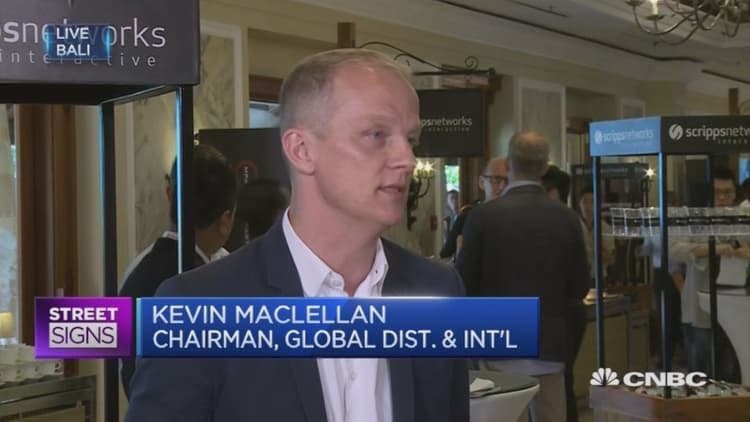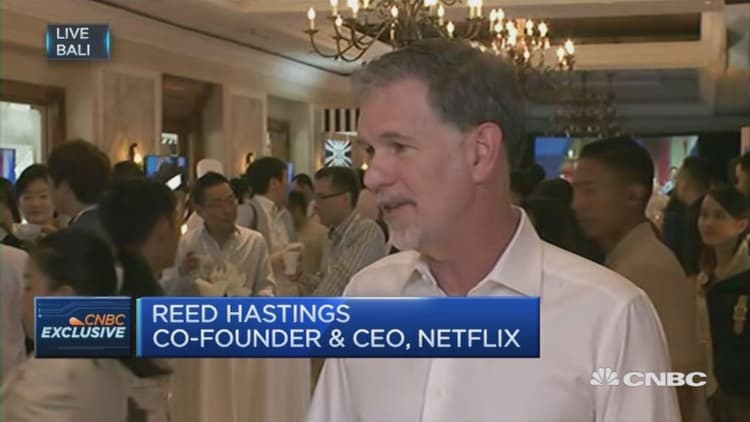
BALI, Indonesia — It's an industry valued at $120 billion this year, and it's growing rapidly.
That juggernaut is the television & video industry in the Asia Pacific, which is being analyzed and dismantled at the APOS summit here in Bali.
Wandering around among soothing waterfalls, and what feels like 100 percent humidity, are some of the industry's biggest players and disruptors. CNBC sat down with some of them to find out what is working, what's not, and why the race is on to serve consumers more for less.
NBCUniversal International Chairman Kevin MacLellan told CNBC that his company is taking a different approach, investing $1.5 billion in digital businesses over the past 18 months. (Comcast is the owner of NBCUniversal, which is the parent company of CNBC.)
"We're not abandoning our current NBC brands at all. We continue to produce content for that, and at this point we're number one in just about any metric you can look at in the U.S. from the broadcast perspective or the cable perspective," he said. "It's been a really successful period for us, but at the same time we're turning the success into investments in adjacent businesses digitally — not just the ones that we brand on our own."

That raises the question of the whether content is more important than distribution — a contentious issue here at APOS.
For MacLellan, it's one and the same: "From that perspective, marrying content and distribution is what the future looks like. You have to have one foot in each because no one is really quite sure what it's going to look like, or where the consumer is going to take us — because at the end of the day they're in charge."
Over The Top – or OTT – is the buzzword at APOS. That's companies like Netflix, Hulu, Singtel's Hooq, Malaysian service iflix and PCCW's Viu.
Recent figures show those digital streaming platforms are gaining subscribers as the overall number of pay TV subscribers slips. Vivek Couto, executive director of Media Partners Asia, said that the market share of online video was only 3 percent in 2012. Today it has 30 percent of the pie. Free-to-air and pay TV have the rest.
But most of the OTT platforms are not direct to consumer, which won't happen until the market develops, according to Fox Networks Group digital chief Brian Sullivan.
"This is a market that's going from an old structure, and it's moving towards a new structure," Sullivan said. "Everybody's experimenting in that transition. Some of those experiments are successful some are failing. But really what you have is a lot of turmoil, and in that turmoil is where all the innovation comes."
And it's not just about how consumers get their programming fix. It's also about the when.

"I think you've got to get to that point, the right tipping point, where enough consumers are consuming their television service and are used to switching onto an app rather than switching into a linear stream. Once that consumer behaviour reaches a tipping point then you know the gates swing wide open," said Mike Sneesby, CEO of Australian streaming service Stan.
The Asia Pacific is a difficult area for the global players, largely because of fragmentation, cultural divides and language barriers. The Chinese market, in particular, has also been notoriously difficult to enter, with strict censorship requirements and data storage regulations. Still, perseverance may be the answer: Earlier this week Netflix announced a licencing deal with Baidu's iQiyi — which has been a long time coming.
In fact, at last year's APOS conference, CNBC asked Netflix CEO Reed Hastings how the company was progressing with its push into China, and he responded that relationships were key.
"I think it's building the relationships in the normal way, and we are making progress on that because we are patient. Because we are not trying to push for a certain date. We are just steadily building those relationships," Hastings said at the time.

For NBC's MacLellan, succeeding in China also means investing in the country: "We're putting money back into China and I think that's the key. If you want to be successful in China it's not just about syphoning out funds, it's about hiring people there and maintaining some sort of revenue stream that goes back into there."
According to Media Partners Asia, the industry in the Asia Pacific region is valued at about $120 billion in 2017 and will balloon to $160 billion by 2022. Along with that, prices for consumers are expected to fall as delivery speeds rise.
A graphic from Media Partners Asia.
Disclosure: NBCUniversal is the parent company of NBC and CNBC.

